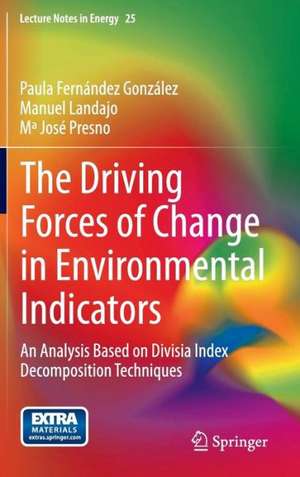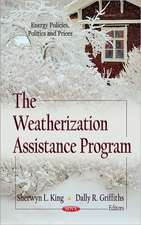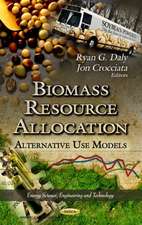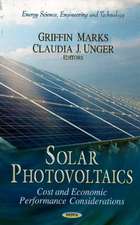The Driving Forces of Change in Environmental Indicators: An Analysis Based on Divisia Index Decomposition Techniques: Lecture Notes in Energy, cartea 25
Autor Paula Fernández González, Manuel Landajo, Mª José Presnoen Limba Engleză Hardback – 25 iun 2014
| Toate formatele și edițiile | Preț | Express |
|---|---|---|
| Paperback (1) | 376.59 lei 6-8 săpt. | |
| Springer International Publishing – 24 sep 2016 | 376.59 lei 6-8 săpt. | |
| Hardback (1) | 361.03 lei 38-44 zile | |
| Springer International Publishing – 25 iun 2014 | 361.03 lei 38-44 zile |
Din seria Lecture Notes in Energy
-
 Preț: 401.61 lei
Preț: 401.61 lei -
 Preț: 436.35 lei
Preț: 436.35 lei - 15%
 Preț: 655.60 lei
Preț: 655.60 lei - 18%
 Preț: 952.09 lei
Preț: 952.09 lei - 18%
 Preț: 1012.84 lei
Preț: 1012.84 lei - 15%
 Preț: 635.80 lei
Preț: 635.80 lei - 15%
 Preț: 645.96 lei
Preț: 645.96 lei - 15%
 Preț: 645.47 lei
Preț: 645.47 lei - 15%
 Preț: 640.06 lei
Preț: 640.06 lei - 15%
 Preț: 649.71 lei
Preț: 649.71 lei - 15%
 Preț: 643.84 lei
Preț: 643.84 lei - 18%
 Preț: 954.31 lei
Preț: 954.31 lei - 15%
 Preț: 643.84 lei
Preț: 643.84 lei - 18%
 Preț: 949.73 lei
Preț: 949.73 lei - 18%
 Preț: 1411.69 lei
Preț: 1411.69 lei - 15%
 Preț: 634.18 lei
Preț: 634.18 lei - 15%
 Preț: 649.87 lei
Preț: 649.87 lei - 15%
 Preț: 642.03 lei
Preț: 642.03 lei - 18%
 Preț: 957.62 lei
Preț: 957.62 lei - 15%
 Preț: 652.49 lei
Preț: 652.49 lei - 18%
 Preț: 963.15 lei
Preț: 963.15 lei -
 Preț: 391.79 lei
Preț: 391.79 lei - 15%
 Preț: 646.11 lei
Preț: 646.11 lei -
 Preț: 394.29 lei
Preț: 394.29 lei -
 Preț: 391.22 lei
Preț: 391.22 lei - 18%
 Preț: 954.45 lei
Preț: 954.45 lei - 18%
 Preț: 957.62 lei
Preț: 957.62 lei - 15%
 Preț: 647.27 lei
Preț: 647.27 lei - 18%
 Preț: 960.30 lei
Preț: 960.30 lei - 18%
 Preț: 1250.74 lei
Preț: 1250.74 lei - 15%
 Preț: 642.18 lei
Preț: 642.18 lei - 15%
 Preț: 639.41 lei
Preț: 639.41 lei -
 Preț: 488.71 lei
Preț: 488.71 lei
Preț: 361.03 lei
Nou
Puncte Express: 542
Preț estimativ în valută:
69.10€ • 75.09$ • 58.09£
69.10€ • 75.09$ • 58.09£
Carte tipărită la comandă
Livrare economică 17-23 aprilie
Preluare comenzi: 021 569.72.76
Specificații
ISBN-13: 9783319075051
ISBN-10: 3319075055
Pagini: 92
Ilustrații: XII, 80 p. 16 illus., 14 illus. in color.
Dimensiuni: 155 x 235 x 11 mm
Greutate: 0.31 kg
Ediția:2014
Editura: Springer International Publishing
Colecția Springer
Seria Lecture Notes in Energy
Locul publicării:Cham, Switzerland
ISBN-10: 3319075055
Pagini: 92
Ilustrații: XII, 80 p. 16 illus., 14 illus. in color.
Dimensiuni: 155 x 235 x 11 mm
Greutate: 0.31 kg
Ediția:2014
Editura: Springer International Publishing
Colecția Springer
Seria Lecture Notes in Energy
Locul publicării:Cham, Switzerland
Public țintă
ResearchCuprins
Literature review and methodology.- Mathematical and statistical properties of decomposition techniques.The Splines Method.- Multiplicative decomposition of the change in aggregate energy intensity in the european countries during the 1995-2010 period.- Additive decomposition of changes in greenhouse gas emissions in the european union in the 1990´s.
Notă biografică
Dr. Paula Fernández González is an associate professor of statistics and econometrics at the department of applied economics, University of Oviedo. She has worked for fourteen years in the fields of Energy and Environmental sciences, focusing on statistical methods, economic modelling and econometrics and paying particular attention to decomposition techniques like shift-share analysis and regression and index-based decomposition methods. She has published papers in international journals such as Energy, Energy Economics, Environmental Science and Policy and Regional Economic Studies. She is also a regular reviewer in the journals Energy, International Journal of Global Environmental Issues and Estudios de Economía Aplicada. At present, she is editor of the Journal of Economics Studies and Research and participates in several research projects of relevance.
Dr. Manuel Landajo is an associate professor of statistics and econometrics at the department of applied economics, University of Oviedo. His research interests include nonparametric statistics, time series analysis and artificial intelligence, with applications to business, economics and environmental fields. He has published papers in a number of journals, including Journal of The Royal Statistical Society-Part C, Journal of Time Series Analysis, European Journal of Operational Research, IEEE Transactions on Fuzzy Systems, Expert Systems with Applications, Knowledge-Based Systems, Empirical economics, and Journal of Forecasting. He regularly serves as project evaluator for public institutions and is also a reviewer for several leading scientific journals.
Dr. María José Presno is an associate professor of statistics and Econometrics at the department of applied economics, University of Oviedo. Her research interests cover time series econometrics, nonparametric methods and index-based decomposition techniques, with applications to economics and environmental economy. She has publishedabout these topics in Economic Letters, Journal of Time Series Analysis, Applied Economic Letters, Annals of the Institute of Statistical Mathematics, Energy and Resource and Energy Economics, among other journals.
Dr. Manuel Landajo is an associate professor of statistics and econometrics at the department of applied economics, University of Oviedo. His research interests include nonparametric statistics, time series analysis and artificial intelligence, with applications to business, economics and environmental fields. He has published papers in a number of journals, including Journal of The Royal Statistical Society-Part C, Journal of Time Series Analysis, European Journal of Operational Research, IEEE Transactions on Fuzzy Systems, Expert Systems with Applications, Knowledge-Based Systems, Empirical economics, and Journal of Forecasting. He regularly serves as project evaluator for public institutions and is also a reviewer for several leading scientific journals.
Dr. María José Presno is an associate professor of statistics and Econometrics at the department of applied economics, University of Oviedo. Her research interests cover time series econometrics, nonparametric methods and index-based decomposition techniques, with applications to economics and environmental economy. She has publishedabout these topics in Economic Letters, Journal of Time Series Analysis, Applied Economic Letters, Annals of the Institute of Statistical Mathematics, Energy and Resource and Energy Economics, among other journals.
Textul de pe ultima copertă
This book addresses several index decomposition analysis methods to assess progress made by EU countries in the last decade in relation to energy and climate change concerns. Several applications of these techniques are carried out in order to decompose changes in both energy and environmental aggregates. In addition to this, a new methodology based on classical spline approximations is introduced, which provides useful mathematical and statistical properties. Once a suitable set of determinant factors has been identified, these decomposition methods allow the researcher to quantify the respective contributions of these factors. A proper interpretation of findings enables the design of strategies and a number of energy and environmental policies to control the variables of interest. This book also analyses the impact of several factors that allow control of these variables; among them, assessment of the specific contribution of improved energy efficiency is particularly relevant. A number of divisia-index-based techniques for decomposing changes in a generic indicator are now available, and these range from classical techniques based on Laspeyres and Paasche weights to more refined approaches relying on logarithmic mean weighting schemes. This book is intended for undergraduates and graduates of energy economics and environmental sciences, environmental policy advisors, and industrial engineers.
Caracteristici
Introduces a new methodology based on classical spline approximations Assesses progress made by EU countries in the last decade in relation to energy and climate change concerns Provides strategies for decomposing changes in both energy and environmental aggregates Includes supplementary material: sn.pub/extras
















